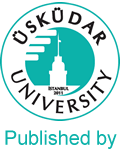ARTICLES
Original Article
Turkish Title : Examining the Relationship between the Knowledge of Sexually Transmitted Diseases and Sexual Myths among University Students in Turkey
Balkanoglu Cuneyt,Erensoy Habib,Donmezler Suleyman,Berkol Tonguc Demir
JNBS, 2021, 8(1), p:54-61
Objective: The purpose of this study is to evaluate the level of knowledge among university students on sexually transmitted diseases (STDs) and to compare the level of knowledge of this sample on STDs and their sexual myths. Methods: The sociodemographic data of 200 university students studying at several universities in Turkey randomly selected between January and March 2019 were evaluated with the “Sociodemographic Questionnaire,” their knowledge of STDs with the Sexually Transmitted Diseases Knowledge Questionnaire (STDKQ), and their beliefs in sexual myths with the Sexual Myths Scale (SMS). Results: There was no difference between the STDKQ and the SMS in terms of demographic variables. However, differentiation was seen between the “sexual behavior,” which is one of the subscales of sexual myths, and STDs. The STDKQ scores revealed that individuals who were previously informed received higher scores than those who did not. The level of knowledge about STDs was higher in men than in women. Conclusion: The knowledge of STDs among university students and their beliefs in sexual myths were evaluated based on sociodemographic variables. According to the results, we obtained from our research to increase the level of knowledge about STDs, and for the healthy development of sexual behavior, formal education including sexual health issues should be provided, research should be done for each region in Turkey on this subject, and in line with the results, necessary information should be provided regarding sexual health.
Objective: The purpose of this study is to evaluate the level of knowledge among university students on sexually transmitted diseases (STDs) and to compare the level of knowledge of this sample on STDs and their sexual myths. Methods: The sociodemographic data of 200 university students studying at several universities in Turkey randomly selected between January and March 2019 were evaluated with the “Sociodemographic Questionnaire,” their knowledge of STDs with the Sexually Transmitted Diseases Knowledge Questionnaire (STDKQ), and their beliefs in sexual myths with the Sexual Myths Scale (SMS). Results: There was no difference between the STDKQ and the SMS in terms of demographic variables. However, differentiation was seen between the “sexual behavior,” which is one of the subscales of sexual myths, and STDs. The STDKQ scores revealed that individuals who were previously informed received higher scores than those who did not. The level of knowledge about STDs was higher in men than in women. Conclusion: The knowledge of STDs among university students and their beliefs in sexual myths were evaluated based on sociodemographic variables. According to the results, we obtained from our research to increase the level of knowledge about STDs, and for the healthy development of sexual behavior, formal education including sexual health issues should be provided, research should be done for each region in Turkey on this subject, and in line with the results, necessary information should be provided regarding sexual health.
Original Article
Turkish Title : Comparison of Job Satisfaction, Work–Life Quality, and Compassion Level between Psychologists and Psychological Counselors
Tahincioglu Dilara,Donmezler Suleyman,Erensoy Habib,Berkol Tonguc Demir
JNBS, 2021, 8(1), p:70-77
Introduction: Various studies have been conducted in the literature on job satisfaction, work‑related quality of life, and compassion with different sample groups. Our aim is to compare psychologists and psychological counselors (PC) in terms of these variables. Methods: It consists of 60 participants; 41 women and 19 men, 30 psychologists and 30 PC, aged between 23 and 52 years, working in schools, clinics, hospitals, and other institutions. Participants filled out a sociodemographic information form and were subjected to the Minnesota job satisfaction scale, the work‑related quality of life scale, and the compassion scale. Ethical Aspect of the Study: This study was approved by the T.R. University of Üsküdar, Non‑Interventional Studies Ethics Committee. Results: It was determined that as the age of psychologists and PC increases, their level of disconnection decreases in terms of compassion (r = −0.264; P = 0.041); thus, their ability to create a rapport increases with age, their compassion fatigue decreases as the workplace changes (r = −0.256; P = 0.048), their job satisfaction decreases as the noise level in the workplace increases (r = −0.433; P = 0.001), their job satisfaction increases as the work‑related quality of
life increases (r = 0.373; P = 0.003), their humaneness increases as their professional satisfaction increases, and their level of indifference and conscious awareness decreases as their compassion fatigue increases. Conclusion: Compassion fatigue is considered to be more related to the traumatic burden of the work done, because as the frequency of workplace changes increases, compassion fatigue decreases. The findings indicate that psychologists and PCs not only need to have suitable working areas available for their work but also need to change their work fields from time to time. It can be argued that the job satisfaction and work‑related quality of life of psychologists and PCs working in private clinics are higher than those working in schools; moreover, the reason for the lower levels of burnouts may be due to the noise levels, as well as the workload at the workplace, other occupational groups, and the culture of the institution.
Introduction: Various studies have been conducted in the literature on job satisfaction, work‑related quality of life, and compassion with different sample groups. Our aim is to compare psychologists and psychological counselors (PC) in terms of these variables. Methods: It consists of 60 participants; 41 women and 19 men, 30 psychologists and 30 PC, aged between 23 and 52 years, working in schools, clinics, hospitals, and other institutions. Participants filled out a sociodemographic information form and were subjected to the Minnesota job satisfaction scale, the work‑related quality of life scale, and the compassion scale. Ethical Aspect of the Study: This study was approved by the T.R. University of Üsküdar, Non‑Interventional Studies Ethics Committee. Results: It was determined that as the age of psychologists and PC increases, their level of disconnection decreases in terms of compassion (r = −0.264; P = 0.041); thus, their ability to create a rapport increases with age, their compassion fatigue decreases as the workplace changes (r = −0.256; P = 0.048), their job satisfaction decreases as the noise level in the workplace increases (r = −0.433; P = 0.001), their job satisfaction increases as the work‑related quality of
life increases (r = 0.373; P = 0.003), their humaneness increases as their professional satisfaction increases, and their level of indifference and conscious awareness decreases as their compassion fatigue increases. Conclusion: Compassion fatigue is considered to be more related to the traumatic burden of the work done, because as the frequency of workplace changes increases, compassion fatigue decreases. The findings indicate that psychologists and PCs not only need to have suitable working areas available for their work but also need to change their work fields from time to time. It can be argued that the job satisfaction and work‑related quality of life of psychologists and PCs working in private clinics are higher than those working in schools; moreover, the reason for the lower levels of burnouts may be due to the noise levels, as well as the workload at the workplace, other occupational groups, and the culture of the institution.
| ISSN (Print) | 2149-1909 |
| ISSN (Online) | 2148-4325 |
2020 Ağustos ayından itibaren yalnızca İngilizce yayın kabul edilmektedir.


